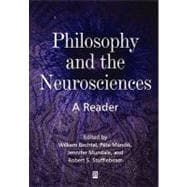
What is included with this book?
Pete Mandik is Assistant Professor and Associate Director fo the Cognitive Science Laboratory at William Patterson University of New Jersey
Jennifer Mundale is Assistant Professor of Philosophy at Central Florida University.
Robert S. Stufflebeam is Assistant Professor of Philosophy at the University of New Orleans.
| Preface and Acknowledgments | viii | ||||
|
xii | ||||
| Part I Neurophilosophical Foundations | |||||
|
3 | (1) | |||
|
|||||
|
4 | (19) | |||
|
|||||
|
|||||
|
|||||
|
23 | (14) | |||
|
|||||
|
37 | (18) | |||
|
|||||
|
55 | (32) | |||
|
|||||
|
|||||
|
82 | (3) | |||
| Part II Language | |||||
|
85 | (2) | |||
|
|||||
|
87 | (13) | |||
|
|||||
|
100 | (12) | |||
|
|||||
|
112 | (22) | |||
|
|||||
|
|||||
|
134 | (18) | |||
|
|||||
|
152 | (27) | |||
|
|||||
|
172 | (5) | |||
| Part III Vision | |||||
|
177 | (2) | |||
|
|||||
|
179 | (20) | |||
|
|||||
|
|||||
|
199 | (10) | |||
|
|||||
|
|||||
|
|||||
|
209 | (16) | |||
|
|||||
|
|||||
|
225 | (29) | |||
|
|||||
|
250 | (3) | |||
| Part IV Consciousness | |||||
|
253 | (1) | |||
|
|||||
|
254 | (24) | |||
|
|||||
|
|||||
|
278 | (17) | |||
|
|||||
|
295 | (17) | |||
|
|||||
|
312 | (20) | |||
|
|||||
|
328 | (3) | |||
| Part V Representation | |||||
|
331 | (1) | |||
|
|||||
|
332 | (17) | |||
|
|||||
|
349 | (20) | |||
|
|||||
|
369 | (26) | |||
|
|||||
|
395 | (24) | |||
|
|||||
|
414 | (3) | |||
| Part VI Reduction | |||||
|
417 | (2) | |||
|
|||||
|
419 | (12) | |||
|
|||||
|
|||||
|
431 | (26) | |||
|
|||||
|
457 | (10) | |||
|
|||||
|
|||||
|
466 | (1) | |||
| Author Index | 467 | (10) | |||
| Subject Index | 477 |
The New copy of this book will include any supplemental materials advertised. Please check the title of the book to determine if it should include any access cards, study guides, lab manuals, CDs, etc.
The Used, Rental and eBook copies of this book are not guaranteed to include any supplemental materials. Typically, only the book itself is included. This is true even if the title states it includes any access cards, study guides, lab manuals, CDs, etc.